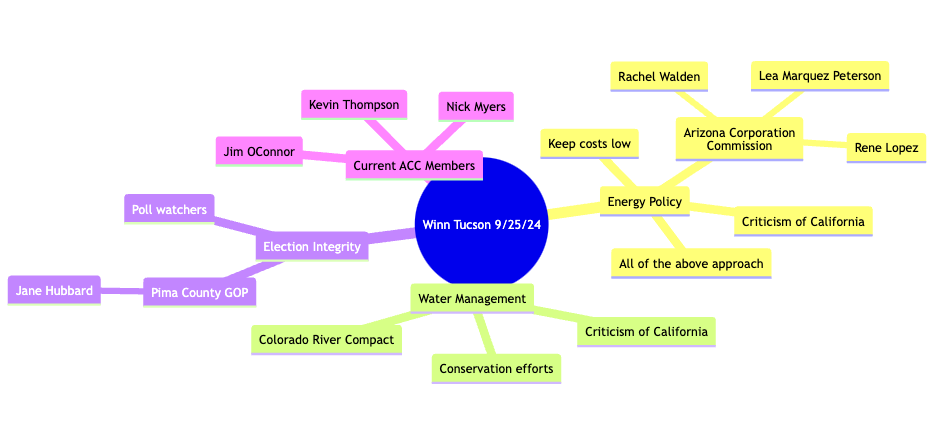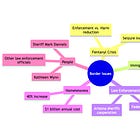💧 Water Wars Heat Up: Arizona ACC Republicans Take Aim at California's 'Wasteful' Practices
🏜️ Desert Dilemma: Balancing Growth and Conservation in the Southwest 🔌 Power Play: The High Stakes of Arizona's Corporation Commission Election
Based on the 9/25/24 Winn Tucson Show on KVOI-1030AM.
🙊 Notable quotes from the show
"We're saying that we have to step aside and allow all options of energy to be considered." - Rachel Walden, on energy policy
"We just happen to be the slowest sinking ship in the harbor." - Rene Lopez, comparing Arizona's energy costs to other states
"If California were to do one-tenth, just one-tenth of the amount of savings and reuse that we do in Arizona, we would not have a water problem in the Southwest." - Rene Lopez, criticizing California's water management
"This is one of the most important elections in our lifetime, and our nation's future is really dependent on this election." - Jane Hubbard, on the need for poll watchers
⏮️ ICYMI: From the Last Show…
😽 Keepin’ It Simple Summary for Younger Readers
👧🏾✊🏾👦🏾
📻 On a radio show, some people talked about important stuff in Arizona. 🔌 They want to make sure everyone has enough electricity without paying too much money. 💧 They also talked about water and how to make sure there's enough for everyone, even when it doesn't rain much. 🗳️ Some people are worried about voting and want to make sure everything is fair when people choose their leaders. 🌞🌬️ They think using all kinds of energy, like the sun and wind, but also gas and coal, is a good idea. They don't want to be like California because they think California wastes too much water and makes electricity too expensive. 👀 They want people to help watch the voting places to make sure everything is okay.
🗝️ Takeaways
🔋 GOP candidates advocate for diverse energy sources, including fossil fuels
💰 Emphasis on keeping energy costs low for Arizona consumers
🌵 Criticism of California's water and energy policies
🗳️ Push for increased election monitoring through volunteer poll watchers
💧 Upcoming renegotiation of Colorado River Compact seen as critical for Arizona's water future
🏭 Resistance to aggressive renewable energy mandates
👥 Focus on local control and tailored solutions for energy and water management
📻 What They Discussed
On Wednesday, September 28, 2024, the conservative radio show Winn Tucson, hosted by Kathleen Winn, featured a discussion on Arizona's energy policy, water management, and election integrity. The show's primary guests were Rachel Walden and Rene Lopez, Republican candidates for the Arizona Corporation Commission. Walden, a former financial services professional and current Mesa Public Schools board member, and Lopez, a former Chandler City Council member with a nuclear engineering and water management background, shared their views on Arizona's energy future. The program also included a segment with Jane Hubbard from the Pima County Republican Party, who discussed efforts to recruit poll watchers for the upcoming election.
🔌 The Power Play: Arizona's Energy Future and the Corporation Commission
The Arizona Corporation Commission, a five-member board with significant influence over the state's energy policy, was the central focus of the discussion. With three seats up for grabs in the upcoming election, the Republican candidates, Rachel Walden and Rene Lopez, along with incumbent Lea Marquez Peterson (who was mentioned but not present), are poised to secure a conservative majority on the commission potentially.
Both Walden and Lopez advocated for an "all of the above" energy approach, emphasizing the need for a diverse energy portfolio that includes both renewable and traditional energy sources. They argued that this approach would help keep energy costs low for consumers while ensuring reliability. Drawing on her financial background, Walden stressed the importance of avoiding mandates for specific energy sources, particularly renewables: "We're saying that we have to step aside and allow all energy options to be considered."
The candidates were particularly critical of California's energy policies, using the neighboring state as a cautionary tale of what they believe could happen if Arizona embraces aggressive renewable energy mandates. Lopez highlighted Arizona's current standing as having the 49th cheapest energy costs in the country, stating, "We just happen to be the slowest sinking ship in the harbor." This metaphor underscored their argument that while energy costs are rising everywhere, Arizona's more conservative approach to energy policy has helped shield consumers from the steeper increases seen in other states.
The discussion also touched on the technical aspects of energy generation and distribution, with both candidates demonstrating knowledge of the complexities involved in managing a state's energy grid. They emphasized the need for baseload power to supplement intermittent renewable sources like solar and wind, arguing that natural gas and even coal still have important roles to play in ensuring reliable power delivery.
💧 Liquid Gold: The Politics of Water in the Desert Southwest
Water management, a critical issue in the arid Southwest, was another major topic of discussion, particularly during Rene Lopez's segment. Drawing on his experience in water management, Lopez provided a detailed overview of Arizona's water situation, emphasizing the state's efforts in conservation and reuse.
Lopez was particularly critical of California's water management practices, arguing that if California implemented even a fraction of Arizona's conservation measures, many of the region's water issues would be resolved.
He stated, "If California were to do one-tenth, just one-tenth of the amount of savings and reuse that we do in Arizona, we would not have a water problem in the Southwest."
The discussion touched on the complex web of water rights and agreements governing the Colorado River, with Lopez highlighting the upcoming renegotiation of the Colorado River Compact in 2026. He emphasized the need for Arizona to advocate strongly for its interests in these negotiations, suggesting that the current allocation of water rights unfairly favors California at the expense of other states in the region.
Lopez also discussed the various water sources available to different communities in Arizona, including surface water from rivers, groundwater, and reclaimed water. He emphasized the importance of local knowledge and tailored solutions, arguing against one-size-fits-all approaches to water management.
The candidates' discussion of water issues reflected a broader conservative approach to resource management, emphasizing local control, technological solutions, and criticism of what they perceive as overreach by neighboring states and the federal government.
🗳️ Guarding the Ballot Box: The Push for Election Integrity
The show's final segment featured Jane Hubbard from the Pima County Republican Party, who discussed efforts to recruit poll watchers for the upcoming election. This segment reflected broader conservative concerns about election integrity, a topic that has gained significant traction in Republican circles since the 2020 election.
Hubbard emphasized the need for "eyes on the process," calling for volunteers to serve as observers at 126 voting centers across Pima County.
She stated, "This is one of the most important elections in our lifetime, and our nation's future is really dependent on this election," underscoring the high stakes many conservatives associate with the upcoming vote.
The discussion of poll-watching efforts touched on various aspects of the voting process, including the need to ensure proper equipment functioning, prevent voter suppression, and secure ballots at the end of the voting day. Hubbard provided detailed information on how listeners could volunteer, including specific instructions for signing up through the Pima County Republican Party website.
This segment reflected a broader conservative narrative about the need for increased scrutiny of election processes. However, critics might argue that such efforts could potentially lead to voter intimidation or unnecessary complications in the voting process.
Throughout the show, the host, Kathleen Winn, maintained a supportive stance towards the Republican candidates and their policy positions, reflecting the program's conservative orientation. The discussion provided insight into current Republican thinking on Arizona's energy policy, water management, and election integrity, highlighting the party's emphasis on local control, skepticism of aggressive climate action, and concerns about election security.
🦉 Three Sonorans Commentary
Unmasking the Conservative Agenda in Arizona's Energy and Water Debate
As we dissect the recent episode of Winn Tucson, we're confronted with a barrage of conservative talking points that demand critical examination. The Republican candidates for the Arizona Corporation Commission, in their zeal to promote an "all of the above" energy approach, reveal a disturbing lack of urgency in addressing the climate crisis that disproportionately affects communities of color and low-income populations.
Let's start with Rachel Walden's assertion that we must "allow all options of energy to be considered." This seemingly reasonable statement masks a dangerous reality: not all energy sources are created equal. By equating fossil fuels with renewable energy, Walden and her cohorts are effectively greenwashing environmental destruction. The time for "considering all options" has long passed.
The scientific consensus is clear: we need rapid decarbonization to avoid catastrophic climate change, which will hit our Chicano and Indigenous communities the hardest.
Rene Lopez's boast about Arizona having the 49th cheapest energy costs in the country is a prime example of the short-term thinking that plagues conservative policy-making. Yes, cheap energy is important for low-income communities, but at what cost? Are we willing to sacrifice our planet's and future generations' health for a few dollars saved on our electric bills today? This myopic focus on immediate costs ignores the long-term economic devastation that climate change will wreak on our communities, particularly communities of color that are already disproportionately affected by environmental hazards.
The candidates' criticism of California's energy policies is particularly galling. While California certainly has flaws, its aggressive pursuit of renewable energy and emission reduction targets should be applauded, not derided. The suggestion that California's policies are driving up costs in Arizona is a classic example of scapegoating, distracting from the real issues at hand.
Perhaps the most infuriating aspect of this conservative lovefest is the water rights and management discussion. Rene Lopez's attack on California's water usage conveniently ignores the complex history of water rights in the Southwest, a history steeped in settler colonialism and the systematic dispossession of Indigenous peoples.
When Lopez speaks of renegotiating the Colorado River Compact, he fails to mention that the original agreement completely ignored the water rights of Native American tribes.
Any discussion of water management in the Southwest that doesn't center on Indigenous rights and environmental justice is fundamentally flawed.
Moreover, the candidates' focus on water conservation as a purely economic issue overlooks the profound cultural and spiritual significance of water to many Indigenous communities. Their approach reduces a life-giving resource to a mere commodity, a perspective that is fundamentally at odds with true environmental stewardship.
The segment on "election integrity" is perhaps the most insidious part of this conservative propaganda piece. The call for poll watchers, under the guise of ensuring a fair election, is a thinly veiled attempt at voter intimidation. We've seen this playbook before: create unfounded fears about election fraud, then use those fears to justify measures that disproportionately affect minority voters. Jane Hubbard's statement that "this is one of the most important elections in our lifetime" is fear-mongering, laying the groundwork for questioning any result that doesn't go their way.
As progressives and advocates for social justice, we must see through these tactics and continue to fight for a just, sustainable, and equitable future for all Arizonans. The Arizona Corporation Commission wields immense power over our state's energy future. We cannot allow it to become a tool for conservative interests that prioritize profit over people and the planet.
We must demand an energy policy that prioritizes rapid transition to renewables, acknowledging the urgency of the climate crisis. We need water management strategies that respect Indigenous rights and recognize water as a sacred resource, not just an economic commodity. And we must vigorously defend voting rights against thinly veiled attempts at suppression.
The struggle for environmental justice, Indigenous rights, and true democracy in Arizona continues. As the Three Sonorans, we call on our community to stay informed, stay engaged, and fight back against this conservative agenda that threatens our future. ¡La lucha sigue!
If you enjoyed this article, buy us a cup of coffee! We 🤎☕‼️
👯 People Mentioned
Kathleen Winn: Host of "Win Tucson" radio show
Rachel Walden: Republican candidate for Arizona Corporation Commission, former financial services professional, Mesa Public Schools board member
Quote: "We're saying that we have to step aside and allow all options of energy to be considered."
Rene Lopez: Republican candidate for Arizona Corporation Commission, former Chandler City Council member, background in nuclear engineering and water management
Quote: "We just happen to be the slowest sinking ship in the harbor."
Lea Marquez Peterson: Current member of Arizona Corporation Commission, running for re-election
Kevin Thompson: Current member of Arizona Corporation Commission
Nick Myers: Current member of Arizona Corporation Commission
Jim O'Connor: Retiring member of Arizona Corporation Commission
Jane Hubbard: Representative from Pima County Republican Party
Quote: "This is one of the most important elections in our lifetime and our nation's future is really dependent on this election."
🧐 Propaganda AI-nalysis
The Winn Tucson radio show employs several propaganda techniques to promote a conservative perspective on energy policy, water management, and election integrity:
Scapegoating: California is repeatedly portrayed as a negative example, blamed for water mismanagement and high energy costs.
Bandwagon: The show encourages listeners to join the conservative cause by supporting Republican candidates and volunteering as poll watchers.
Card stacking: The program presents only the Republican perspective on issues, omitting opposing viewpoints or potential drawbacks of their proposed policies.
Glittering generalities: Phrases like "all of the above energy approach" and "election integrity" are used to evoke positive emotions without providing specific details.
Fear-mongering: The discussion about election integrity uses language that suggests the election could be compromised without volunteer poll watchers.
Simplification: Complex issues like energy policy and water rights are reduced to simple narratives of Arizona (good) versus California (bad).
Testimonial: The candidates' backgrounds are highlighted to lend credibility to their positions.
Repetition: Key themes, such as keeping energy costs low and criticizing California, are repeated throughout the show to reinforce the message.
False dilemma: The energy discussion presents only two options - the Republican "all of the above" approach or expensive, unreliable renewable mandates - ignoring other possibilities.
Appeal to tradition: The resistance to aggressive renewable energy adoption is partly based on maintaining traditional energy sources and approaches.
This propaganda approach aims to reinforce conservative viewpoints on energy, water, and election policies while demonizing opposing perspectives, particularly those associated with California or more liberal policies.








